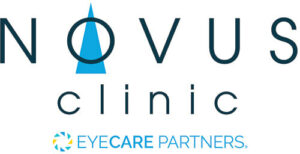
Are cataracts blurring the world around you? At Novus Clinic, we understand how important clear vision is for your quality of life. Our dedicated team of experienced eye doctors is here to guide you through every step of your cataract treatment journey. Regain the clarity you deserve with state-of-the-art cataract surgery in the Tallmadge area.

Imagine life without the haze of cataracts. Our advanced cataract surgery options, including advanced intraocular lens (IOL) choices, are designed to restore your vision and improve your day-to-day life. Whether you’ve been dealing with fuzzy vision, sensitivity to light, or difficulty with daily tasks, our experienced cataract surgeons are ready to help.
Our compassionate team is excited to be a part of your journey to better vision. Learn more about your Tallmadge area cataract specialists, then schedule a consultation and come meet them in person.
View All Doctors
While mild cataracts may be correctable with glasses or contacts, cataract surgery is the only way to effectively treat moderate to advanced cataracts. During cataract surgery, the cloudy lens is removed and replaced with an artificial intraocular lens (IOL). Cataract surgery is an outpatient procedure and one of the most commonly performed surgeries.
Your journey begins with a comprehensive evaluation. Your eye doctor will assess your eye health, discuss your symptoms, and recommend the best course of action for your needs. If cataract surgery is right for you, they will also discuss your IOL options and help you choose one that is best for your vision and lifestyle.
Cataract surgery is a minimally invasive procedure that typically takes the surgeon less than 30 minutes. Our team utilizes small incisions and advanced techniques to gently remove the cloudy lens and replace it with a clear artificial lens, improving your vision instantly.
After your surgery, you will have certain restrictions you need to follow. You will not be able to drive home from surgery on your own, so plan to have a friend or family member drive you home. Depending on your individual needs, your surgeon may provide dark glasses to reduce any glare you may experience after surgery and give your eyes a chance to rest and heal. Your doctor may also prescribe you eye drops or other medicine to help you recover from cataract surgery. After a short recovery period, many patients report enhanced clarity and brighter colors immediately. You will need to restrict certain activities, such as swimming and strenuous exercise, for several weeks after surgery. We’ll provide you with detailed postoperative instructions and schedule follow-up appointments to ensure a smooth recovery process.

Cataracts are a common age-related condition where the natural lens of the eye becomes cloudy, causing vision to deteriorate. The National Eye Institute estimates that about 50% of Americans have cataracts by the age of 75. While cataracts are not painful, they can severely interfere with quality of life and can even cause blindness if left untreated.
Cataracts are a normal part of aging that happens when proteins in the eye start to break down. Some people may be predisposed to cataracts due to genetics or certain health conditions.
While there are steps you can take to protect your overall eye health, such as wearing UV-protective sunglasses and not smoking, cataracts cannot be prevented. The good news is that modern cataract surgery is a safe and effective solution.
Cataract surgery is recommended when cataracts significantly affect daily activities and quality of life. When vision loss starts to interfere with tasks like driving, reading, or recognizing faces, surgery may be considered.
According to the American Refractive Surgery Council, cataract surgery is widely known as a safe and effective procedure, with a complication rate under 2%.
There are a number of factors that influence the cost of cataract surgery. These include whether you need cataracts removed from one or both eyes, the type of surgical equipment used, and the miscellaneous needs of your unique eyes. For more information about the cost of your procedure and payment options, contact your Novus Clinic care team.
The choice of intraocular lens (IOL) used during surgery can influence your need for glasses after the procedure. Standard monofocal IOLs correct vision at a single distance. Some premium IOLs are designed to correct refractive errors like nearsightedness, farsightedness, astigmatism, and presbyopia, reducing the need for glasses. Depending on the IOL you choose, you might still need reading glasses or glasses for other specific tasks.
A posterior capsulotomy is a surgical procedure that is sometimes necessary after cataract surgery, also commonly referred to as a “YAG” (for the type of laser used). Some patients experience cloudy or blurry vision after cataract surgery, with symptoms becoming noticeable anywhere from a few months to many years after surgery. In those cases, a simple one-time YAG procedure can be performed to clear their vision.
At Novus Clinic, we offer a wide range of premium IOL options, including multifocal lenses that can correct vision at multiple distances, as well as lenses that treat astigmatism. Your eye doctor will explain which options may be right for you.